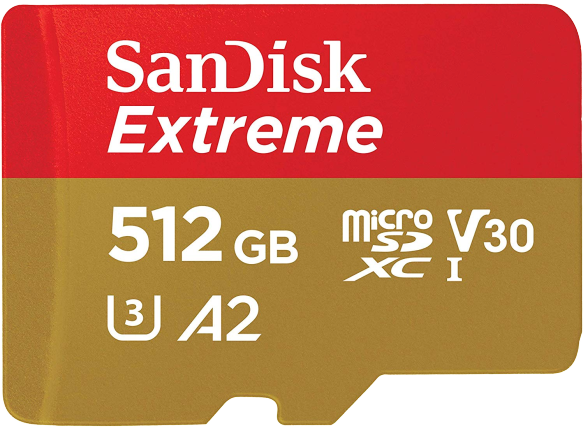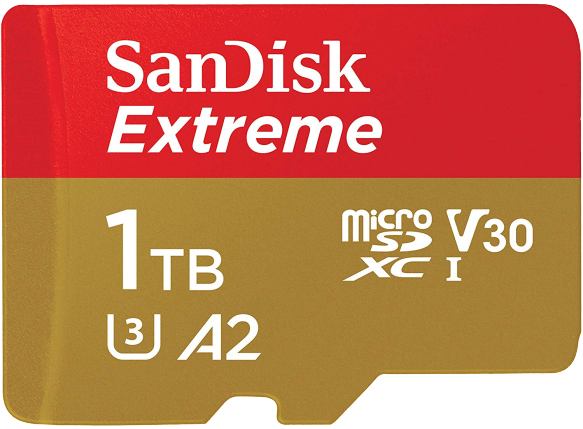Samsung starts the S20 off with 128GB of memory. Still, if you like to download movies for trips like me or are just an absolute shutterbug that needs to capture literally every moment of your or your kid's life, you'll probably want to invest in a microSD card. It's the perfect thing to expand and offload your media so that the internal memory can be used for apps and those super-duper slow-mos.
Best for apps
Lexar Professional 667x 256GB
Don't let that slightly slower number in the card's name fool you, the 667x card is still a V30 card, but it's got the upgraded A2 rating for storing and running apps directly on the card.
4K-ready
PNY Elite-X 128GB
PNY's card is rated V30, which is a fancy way of saying it supports up to 30MB/s write speeds for recording video — and it has an A1 certification for storing Android apps and app data.
Double your storage
Samsung Evo Select 128GB
This little green card can double the storage on your Galaxy S20 for less than pizza night for the fam, and it's a series that has served us well for years of Samsung flagships.
Fit for a king
Kingston Canvas Select Plus 256GB
Kingston has possibly the easiest browsing experience for microSD cards because all three lines are on a single listing, and its cards can write at speeds up to 80MB/s.
Lifetime warranty
SanDisk Extreme 512GB
SanDisk is one of the most trusted names in SD cards for professionals because they can take a real beating and because cards like this one will outlast your S20.
Sturdy and speedy
Samsung Evo Select 512GB
Half a terabyte of storage should be more than enough to hold the movie marathon for your international trips, and it's been tested to withstand extreme temps and seawater.
High capacity for less
Lexar 633x 512GB
This sports the same certifications for write speed and app performance, so why is it so much more affordable than the Samsung and SanDisk? Less vanity in the brand.
Super-size it
SanDisk Extreme 1TB
This is the biggest microSD card you can get for a phone right now, capacity-wise, and on top of being a 4K-ready card, it's rated A2 for running and storing Android apps.
What all those symbols on a microSD card mean — and why they don't always matter
Manufacturers cover just about every space centimeter of a microSD card in classifications and certifications, and these symbols can be useful in ruling out slow cards quickly. However, looking at those symbols should never be the end of your research into a microSD card.
- Video Speed Class — Indicated by a stylized V followed by numbers from 6 to 90, this class is one of the newer classification systems and was developed specifically for shooting ultra-high-definition video. V30 starts at 30MB/s write speed, V60 starts at 60MB/s write speed, and V90 starts at 90MB/s, but unless your phone somehow shoots 8K video, you probably don't need a V90 card.
- UHS Speed Class — Indicated by a 1, 2, or 3 inside a U, this class is still used on most cards today. U1 starts at 10MB/s write speed, U3 starts at 30MB/s write speed, and both are perfectly adequate for most Android phones.
- Speed Class — Indicated by a number inside of a C, this was the original classification system for SD cards. Class 10 was as high as this class went, 10 MB/s write speed, and practically every card worth buying today is well beyond this speed at this point, so it's not as helpful an indicator of power/quality these days.
Notice that those specifications focus on write speed, which is the lower of the two speeds a card will have. Read speed is almost always faster than write speed, so if you see a card that only mentions "transfer speed" of 100 MB/s but is a V30 card, we can infer that the read speed is 100 MB/s and the write speed is at least 30 MB/s.
It's essential to look beyond the symbols and see what the write and read speeds are supposed to be. U3/V30 cards can have actual write speeds above some V60 cards. If a V60 card has a listed write speed of 80 MB/s, there are some V30 cards out there with 90 MB/s write speeds. So read the specs!
Go beyond internal storage
For most of us who just want to store some movies, music, and a couple hundred thousand pictures of our adorable dogs and kids, all you need is a U3/V30 card, which covers literally every card in here! At that point, it simply becomes a matter of finding the size and reliability you want. For a Samsung phone — and really, for every phone with a microSD slot — I highly recommend the Samsung Evo Select. It's all but guaranteed to outlast your phone. Plus, it is fast enough for everything except those ultra super slo-mo videos that Samsung won't let you record to any microSD card.
If you intend to be running apps on your microSD card — I want to know how you filled 128GB to need to put apps on your microSD card, by the way — A2 cards are becoming more common and more affordable with each passing season. The Lexar Professional 667X is a great card. The 256GB size will triple the amount of storage you've got to work with, which means that you should be able to run thousands of apps from it if you are a complete and utter madman.
from Android Central - Android Forums, News, Reviews, Help and Android Wallpapers https://ift.tt/2ShQLNU
via IFTTT








Aucun commentaire:
Enregistrer un commentaire